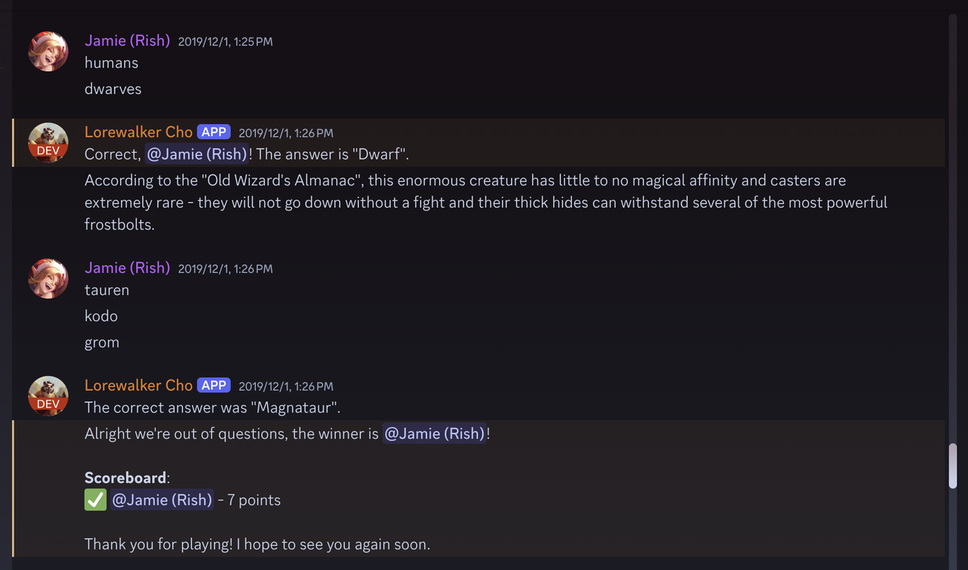Projects
This is a list of a few open source side projects I’ve worked on over the years. Most of them are one-offs and aren’t actively maintained. This list is non-comprehensive and is a showcase of the projects I consider the most interesting and relevant.
Lorewalker Cho

Lorewalker Cho is a fully functional Discord bot that plays games where it asks trivia questions related to the game World of Warcraft. The bot is written in Python 3 and uses the wonderful discord.py library and uses PostgreSQL as a backend for storing Discord server configurations and scoreboards.
Features:
- Allows setting custom trivia channels and prefixes (admin only).
- Is able to error correct misspelled words in answers.
- Keeps track of player scores in the Discord server.
I don’t currently have this bot hosted anywhere since I’m not actively using it on any of my servers
at the moment. You will probably have to update discord.py to be able to use it since I’m sure
Discord has made some breaking changes since I’ve last used this.
Want to add questions to Lorewalker Cho? Create an issue on
GitHub and use the question-request label.
Include your question text, answer and topic of the question being submitted.
jamiekuppens.com

jamiekuppens.com is the website that you’re on right now! It was created with Astro and it uses a custom theme designed by myself. This website was designed to be as small and fast as possible.
Previously this website was written in Hugo, which I still adore, but I much prefer using JSX for customizing my site instead of templates.
Google Calendar Discord Syncer
Google Calendar Discord Syncer is an interactive CLI application written in Python that syncs Google calendar events to a Discord server channel using embeds. I wrote this a long time ago when Discord didn’t support events yet so that I could have nice looking signup posts for World of Warcraft raids events in my guild.
The other reason why I wrote this tool was because I got tired of copy-pasting event posts and adjusting the times in them two times a week. However, I’ve since replaced it with Raid Helper since it supports scheduling event posts while also automatically changing the date.
5e Item Generator
5e Item Generator is a React website that generates homebrew items for D&D 5e with random attributes. Right now it only generates basic items, but I plan on expanding on this in the future.
Coffee Boy
Coffee Boy is a work-in-progress GameBoy and GameBoy Color emulator I’m writing in TypeScript. I plan on returning to this and finishing it up eventually. When it’s done I’m thinking of including a demo of it in this website with an open source test ROM, and also including a feature to let you use your own.
Notch
Notch is a CHIP-8 virtual machine written in Rust. I wrote it after getting interested in emulation from the Ferris Makes Emulators stream. It has worked with all games I threw at it so far, but can use a little polishing and refactoring.